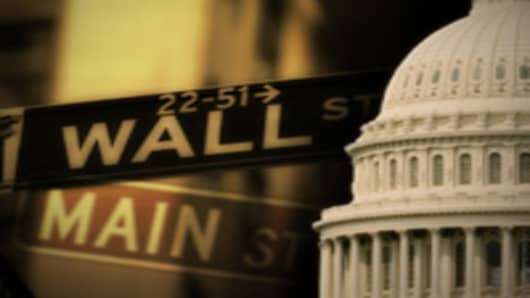Though the new Congress hasn't even been seated yet, Wall Street already may be getting what it wanted from the November election rout.
An apparent deal struck between President Obama and congressional Republicansto preserve the 2001 and 2003 tax cuts has raised hopes that the much-ballyhooed "gridlock" in fact is already yielding positive results for investors.
"The fact that we're seeing some compromise in Washington shows this may be a constructive gridlock. We're getting things done," said Art Hogan, managing director of Jefferies in Boston. "The overarching importance of this is on the front end. You get the possibility of gridlock being a positive, with the administration and Congress both moving to the center. I think you're going to have a net positive benefit going forward for a longer period of time."
Should the compromise hold, what have become known as the "Bush tax cuts" would remain steady for all income levels, after a bitter dispute over whether they should be maintained for those on the top tier.
In addition, a 15 percent rate on capital gains would be extended along with a 35 percent estate tax with a $5 million exemption. The employee portion of the Social Security tax also would drop by two percentage points to 4.2 percent, and there are a slew of business tax breaks included as well.
Overall, the agreement "would represent a significantly more positive fiscal outcome for 2011 than we and most others have been expecting," said Jan Hatzius, chief US economist at Goldman Sachs, in a note to clients.
Goldman estimates the tax agreement would add $185 billion in stimulus for 2011 on top of further help in corporate tax provisions and the Federal Reserve's continued efforts to inject money into the economy.
Perhaps more importantly for the markets, however, is the removal of some uncertainty that existed both over the status of the tax levels and what the political climate would be in Washington once the Republicans take over the House of Representatives in January.
Obama's willingness to strike a dealis kindling memories of President Bill Clinton's triangulation strategy that he employed successfully in dealing with a Republican Congress during the 1990s.
"Perhaps this gets confidence back in and the market gains momentum," said Quincy Krosby, market strategist at Prudential Financial in Newark, N.J. "The key to watch is whether this is the beginning of the president moving toward the middle with a pragmatic approach in order to win 2012. What you want is a president who can do that. If this is the beginning of that process, it's a very good thing for the economy."
Retailers and other segments of small business were seen as early winners as they would have been the most greatly impacted if the cuts were removed for the top tier, which includes individuals earning more than $200,000 and couples earning more than $250,000.
"To get this economy moving more toward its potential at this stage of the recovery is essential. This move by the president helps us toward that goal," Krosby said. "The economy needs to grow on its own, it needs to gain traction. Confidence is the key to this, the key building block."
One lingering question as far as the market goes is whether investors already have priced in the tax compromise, making any gains short-lived.
The early sentiment, though, seemed to be there was enough uncertainty previous to the compromise that it could have a lasting impression, both on its own and as a signal of what's to come.
"This has yet to be priced in. This has been an unknown," Hogan said. "You haven't seen the flexibility of the administration until this weekend—to cut a deal on this and get it done hopefully without the usual rancor that comes with partisan politics."
To be sure, the economy still has plenty of long-range issues.
The unemployment rate jumped to 9.8 percent in November, real estate remains mired in a weak recovery and is teetering on a double-dip, and European debt problemsare likely to continue for the next several years.
That leaves the jury still out a bit on how far moves like the tax cut deal can carry.
"This is unambiguously positive for the near term. It's better than the alternative, which would be to have taxes go up, if you want to stoke a recovery," Kevin Caron, market strategist at Stifel Nicolaus in Baltimore, said on CNBC (see video). "There is some risk appetite there (in the market). It's just important that we continue to put policies in place that stoke that improvement and not squash it. This compromise is a partial step in the right direction."
The market has been resilient this year despite all its obstacles, with the Standard & Poor's 500 gaining 9.7 percent heading into Tuesday's session. So the hope is that if the stock market has weathered so much turbulence this year, the normally strong third year of the presidential cycle will yield even better results in 2011.
"The capital markets are showing an elasticity and a flexibility to outside inputs that they have now shown since the crisis," Kevin Ferry, president of Cronus Futures Management, told CNBC. "To me, that is an unmitigated success."



